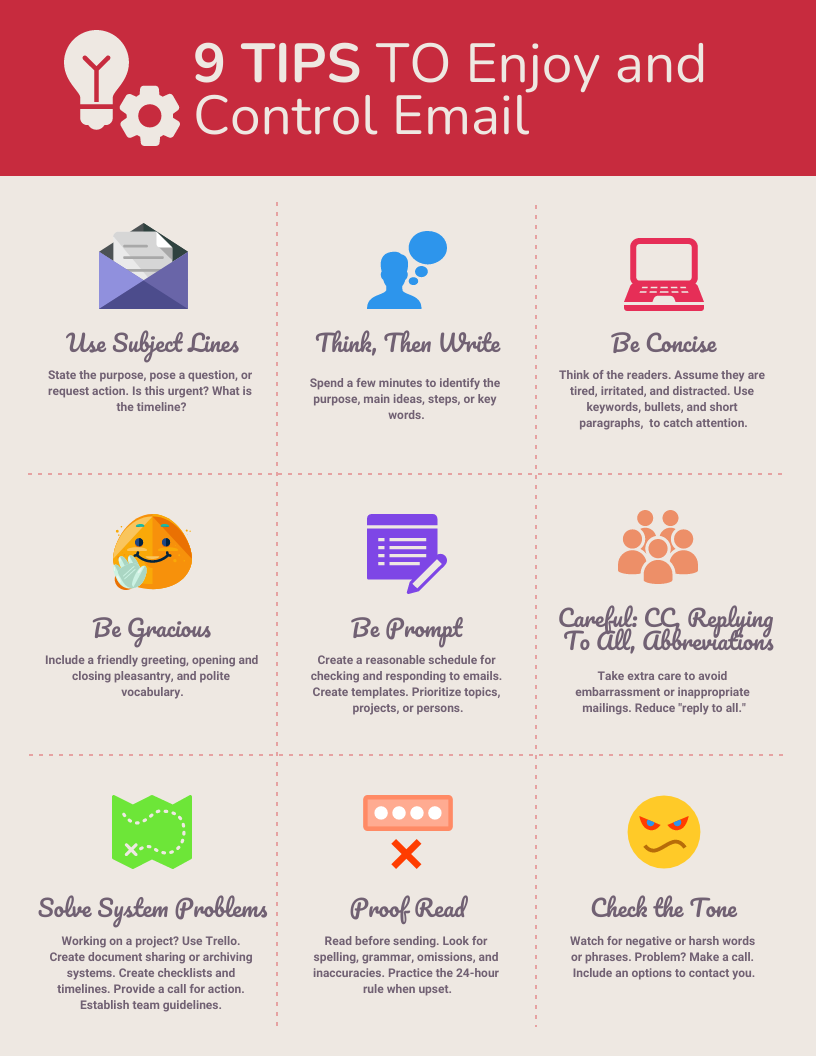Email Overload: Is it Possible to Control and Enjoy Email?

Geraldine Markel, PhD
March 2021
Email Overload?
“I received 23 emails from one person before they left on vacation.”
“Instead of using a spreadsheet, to begin with, we round-robin sending email lists and requests. It’s a waste of time and energy.”
“It wasn’t until the third paragraph of the email that I found out what to do.”
“All day and night, I’m drowning in emails, texts, calls, and photos. The dog is cute, but do I need 5 photos of him?”
In 2019, 293.6 billion emails were sent and received each day, and predictions are that this number will increase. How many hours a week do you spend on emails? The average worker spends 13 hours a week (Link).
Email overload and the stress surrounding our efforts to control it interferes with work/life productivity. However, research indicates that management strategies exist to help reduce the problem (Link).
Unfortunately, too many email users don’t have a process for handling emails. Failing to use the most basic system, they flounder during the day—and perhaps the night. To prioritize items, categorize incoming mail according to its purpose. For example, do you need to present information, reply to a request, or forward information? Also, alert others by indicating your purpose in subject line. Whether you are sending or responding, clarity about purpose wards off unnecessary stress and strain.
In terms of attention and focus, email overload contributes to distractibility. For example, when you keep glancing at your email, your attention is diverted from other tasks. It is difficult and time-consuming to get back on track. When are the best times to check emails, and when is “think time” required to create or respond to essential emails?
4 Steps to Create Efficient Email Habits:
First, review your patterns. For example, what number of emails do you send and receive? Are you up until all hours of the night attending to emails? How can you better manage your time and energy?
Second, ask, “How important are the emails you receive?” Instead of sending emails back and forth to schedule a meeting, perhaps use an app, such as doodle (Link).
Third, ask, “How often do I delete irrelevant emails?” Whether once a day or a week, you must be ruthless and delete often.
Fourth, review your perspective. View your work-related email as real work. It isn’t a task that you glance at periodically during the day or quickly dash off a reply about an important issue. Similarly, personal email may involve important legal, financial, or health matters. Whether with work or personal emails, identify those of high priority and schedule ample “think” times to deal with them when you are most alert and attentive.
7 Tips for Greater Email Control:
- Restrict checking Email to specific times of the day and let others know your schedule.
- Create a practical archiving system and use it, at least weekly.
- Delete and unsubscribe every week.
- Schedule tasks on your calendar, not your email inbox.
- Use the subject line to request action and due dates versus to provide information.
- Consider using a project management application such as Trello (Link) to reduce team member email and focus on task management.
- Delineate for yourself and others when to use email versus text messaging or phone.
Dealing with email doesn’t have to be drudgery or punishment. Yes, it may be a task that is boring, too detailed, or overwhelming; still, it is a responsibility that needs attention. When you consciously organize your time and space, you are more motivated and attentive.
5 Tips for Greater Email Enjoyment:
- Find a location that is non-distracting with decent light and a comfortable chair.
- Set the stage for productivity and pleasantness. Might you want soft music playing, white noise such as a fan, or a snack before starting?
- Relax by taking 4 deep breaths. Then stretch your arms and legs, and then sit down and rest your eyes for a moment or two.
- Sit up and again close your eyes. Imagine a time when you were productive and in a pleasant and comfortable place.
- Set a realistic period to work, perhaps using a timer. Then say, “Now I’m ready to work.”
Create good email habits if you want to feel greater control and less irritation. Devise a system of attack that suits your style and the requirements of your work or personal email. Then, create a pleasant setting that enables good focus and concentration. You may be surprised at your effectiveness. You’ll be ready to congratulate yourself on a job well done.